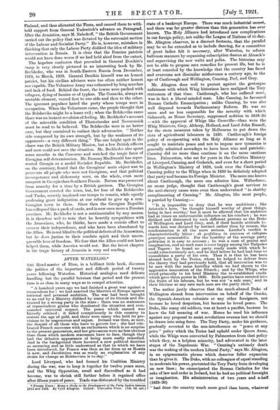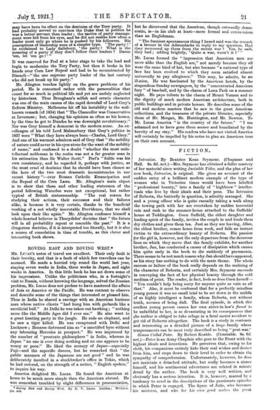AFTER WATERLOO.*
THE Head-master of Eton, in a brilliant little book, discusses the politics of the important and difficult period of twenty years following Waterloo. Historical analogies need delicate handling, but the parallel between that period and the present time is so close in many ways as to compel attention.
"A hundred years ago we had finished a great war against a tremendous foe : we had asserted the liberties of Europe against 'national and personal ambition. The war had been brought to an end by a Ministry disliked by many of its friends and dis- trusted by a strong party in the state : there was no statesman of transcendent genius who dominated the situation and com- manded universal respect. The peace which ensued was bitterly critized : it failed conspicuously in this country to restore the age of gold, and there were many who held its pro- visions to be ungenerous and unjust. Ireland was then, as now, the despair of all those who have to govern her : she had cele- brated French successes with an enthusiasm which is no surprise to the present generation, and her grievances were no less obvious than those which modern statesmen have to face, though they had the delusive appearance of being more easily remedied. And in the background there hovered a new political doctrine as menacing and as little understood as that to which we have been introduced, for France was then as far from us as Russia is now, and Jaeobinism was as ready an explanation of any desire for change as Bolshevism is to-day."
Lord Liverpool, who had formed his Coalition Ministry during the war, was to keep it together for twelve years more, and the Whig Opposition, small and discredited as it had become, was to shrink still further before it regained office after fifteen years of peace. Trade was dislocated by the troubled
■ 2'tosis4, Yea.-,: Being a Study in Me Development of the Party System between 1815 and 1835. By Cyril Alluttoa. Oxford : Clareadou Press. [11. 6d. net.]
state of a bankrupt Europe. - There was much industrial unrest, and there was fax greater distress than this generation has ever known. The Holy Allianee had introduced new complications in our foreign policy, not unlike the League of Nations of 6-day. Mr. Alington observes, in a discreet footmote, that the parallel may be •so far extended as to include dancing, for a committee
of great ladies felt it necessary, after Waterloo, to reform ballroom manners by organizing subscription dances at Almack's and supervising the new waltz and polka. The historian may not be able to propose sure remedies for present ills, but he is at least consoled by the knowledge that the country has faced and overcome not dissimilar misfortunes a century ago, in the age of Castlereagh and Wellington, Canning, Peel, and Grey.
Mr. Alington does well to protest against the grotesque unfairness with which Whig historians have maligned the Tory statesmen of that time. Castlereagh, who has suffered most, was in fact a liberal-minded man. Like Canning, he favoured Roman Catholic Emancipation ; unlike Canning, he was also
well disposed towards Parliamentary Reform. He was no more and no less responsible for the severity with which Sidmouth, as Home Secretary, suppressed sedition in 1819-20 —with the approval of Whigs like Grenville—than were the Whig Ministers, Grey, .Althorp, Holland, and Lord John Russell, for the stern measures taken by Melbourne to put down the riots of agricultural labourers in 1830. Castlereagh's foreign policy of co-operating with the Holy Alliance so long as it sought to maintain peace and not to impose new tyrannies is generally admitted nowadays to have been wise and patriotic. Canning did no more than continue it on the same cautious lines. Palmerston, who sat for years in the Coalition Ministry of Liverpool, Canning, and Goderich, and even for a short period in Wellington's Ministry of 1828, took over the Castlereagh- Canning policy to the Whigs when in 1830 he definitely adopted that party and became its Foreign Minister. The more one knows about Castlereagh, the more one admires him. Wilberforce, no mean judge, thought that Castlereagh's great services to the anti-slavery cause were even then undervalued "in shabby complimenting of Canning." Mr. Alington, like most people, is puzzled by Canning:—
" It is impossible to deny that he was ambitious ; like Aristotle's hero, ` he thought himself worthy of great things, being in fact worthy,' but it must be allowed that his ambition had at times an unfavourable influence on his conduct ; he was disliked and distrusted by such different persons as the Duke of Wellington and Lord Grey, and, if their hostile attitude to- wards him was dictated by instinct rather than by reason, the condemnation is all the more serious. Landor's verdict is characteristically bitter oh per f idiam in atnicurn et collegam praecipue memorabilia. For the hostility of the average party politician it is easy to account ; ho was a man of genius and imagination, and no such man is ever happy among the Tadpoles and Tapers : he found no party ready made with which he could conscientiously act, and he died before he had had time to consolidate a party of his own. Thus it is that he has been abused both by the Tories, whom he helped to deliver from the theory they had previously held, that all innovation was to be met with the same hostility which we had shown to the aggressive innovation of the French ; and by the Whigs, who owed primarily to his brief Ministry the re-established credit which gave them power in 1830. Both parties have entered into the fruits of his labours, but he was not 'a safe man,' and in their lifetime at any rate such men are the party idols."
The author justly observes that the much-abused Duke of Wellington shrank from intervention on behalf of the Greeks, the Spanish-American colonists or any other foreigners, not because he loved despotism, but because he loved peace. The Duke, like many old soldiers, was at heart a pacifist, because he knew the full meaning of war. Hence he used his influence against any proposal to assist revolutions oversea lest we should be drawn into using force. The Tory Party, under his guidance, gradually reverted to the non-interference or "peace at any price" policy which the Tories had upheld under Queen Anne, while the Whigs were converted by Palmerston from that policy which they, as a helpless minority, had advocated in the later stages of the Napoleonic War. " Canning's untimely death was the making of the modern Liberal Party," says Mr. Alington, in an epigrammatic phrase which deserves fuller expansion than he gives it. The Duke, with no colleagues of equal standing to moderate his power, prevented the Tory Party from developing on new lines ; he emancipated the Roman Catholics for the sake of law and order in Ireland, but he had no political foresight or imagination. His administration of two years and a-half (1828-30) "had done the country much more good than harm, whatever
may have been its effect on the destinies of the Tory party. It had probably served to convince the Duke that m politics he was a better servant than leader ; the tactics of .party manage- ment were hid from his eyes, and he did not realize how often a leader must only go where he is pushed by his followers. His conceptions of leadership were of a simpler type. ' The party!' he exclaimed to Lady Salisbury, the party! What is the meaning of a party if they don't follow their Leaders? Damn 'em, let 'em go ! "
It was reserved for Peel at a later stage to take the lead and begin to modernize the Tory Party, but then it broke in his hands over Corn Law Repeal and had to be reconstructed by Disraeli—" the one supreme party leader of the last century who did not break up his party."
Mr. Alington touches lightly on the grave problems of his period. He is concerned rather with the personalities that count for so much in political life and yet are unduly neglected by historians. Thus Brougham's selfish and erratic character was one of the main causes of the rapid downfall of Lord Grey's Reform Ministry. Melbourne hit off his instability in the well- known remark (of 1834) that "The Chancellor was Conservative at Inverness ; but, changing his opinions as often as his horses, by the time he got to Dundee he was downright revolutionary." Nor was Grey himself a democrat in the modern sense. An ex- colleague of his told Lord Malmesbury that Grey's politics in
1837 were "What they have always been—Charles, Lord Grey." And one of his warmest admirers said of Grey that "the nobility of nature could never in his eyes atone for the want of the nobility of name," and confessed to a doubt "whether the most unin- tellectual nobleman in the realm was not a far greater man in his estimation than Sir Walter Scott." Peel's "foible was his own consistency, and he regarded it, perhaps with justice, as the most cruel of destinies that he should have been chosen as the hero of the two most dramatic inconsistencies in our recent history "—over Roman Catholic Emancipation and the Repeal of the Corn Laws. Mr. Alington's main object is to show that these and other leading statesmen of the period following Waterloo were not exceptional, but rather typical of British statesmanship. "The real reason for studying their actions, their successes and their failures alike, is because it is very certain, thanks to the beneficial working of a not wholly inscrutable Providence, that we shall look upon their like again." Mr. Alington confesses himself a whole-hearted believer in Thucydides' doctrine that "the future will in all probability repeat or resemble the past." It is a de,ngerous doctrine, if it is interpreted too literally, but it is also a source of consolation in time of trouble, as this clever and interesting book shows.











































 Previous page
Previous page